Student Profile: Jon Ong
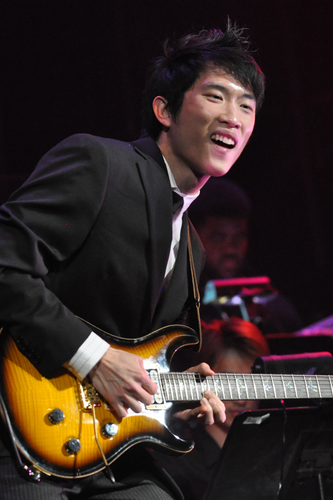
Jon Ong<br>
<b>Major:</b> Film Scoring<br>
<b>Instrument:</b> Guitar<br>
<b>Hometown:</b> Singapore
Photo by Phil Farnsworth
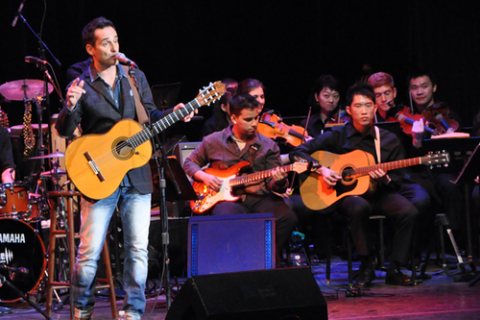
Ong and Serghio Jansen (center) back Jorge Drexler.
Photo by Phil Farnworth
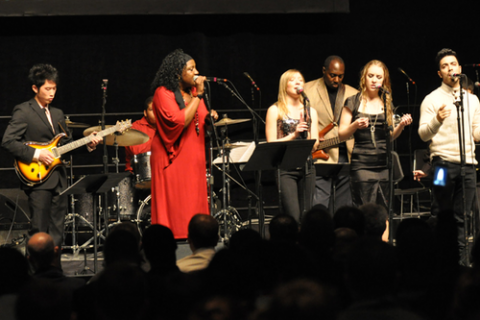
Ong supports Darcel Wilson, Naomi Gillies, Winston Maccow, and Louis Figueroa at the 2011 High School Jazz Festival.
Photo by Phil Farnsworth
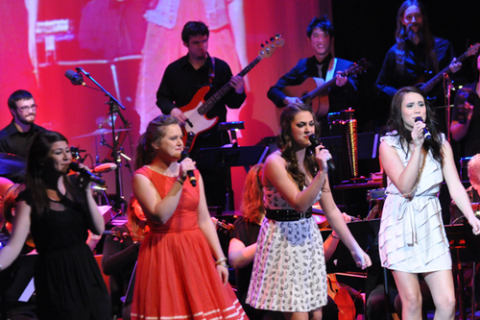
Ong goes country for the Great American Songbook: The Sounds of Nashville.
Photo by Phil Farnsworth
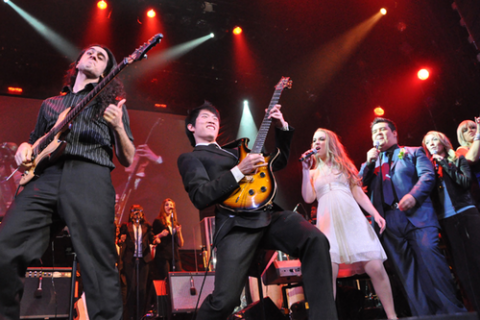
Ong takes the spotlight at the fall 2010 Singers Showcase: The Other Side of Abbey Road.
Photo by Phil Farnsworth
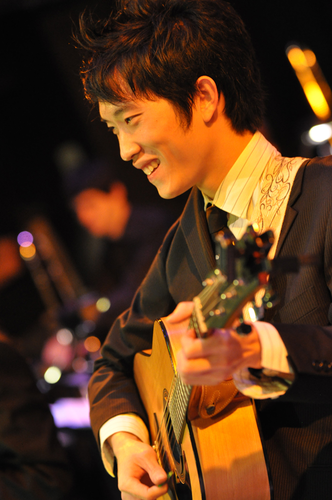
Ong switches to acoustic guitar at the fall 2010 Singers Showcase: The Other Side of Abbey Road.
Photo by Phil Farnsworth
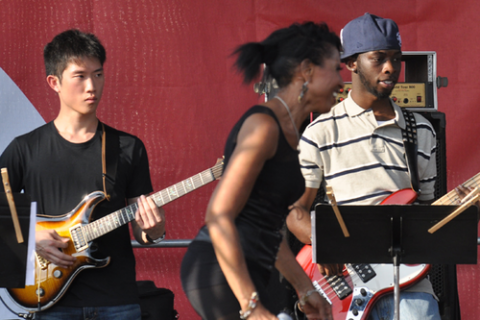
Ong backs Nona Hendryx at the 2010 Berklee Beantown Jazz Festival.
Photo by Phil Farnsworth
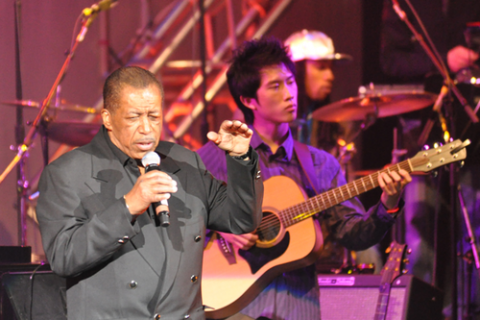
Ong and Ben E. King at the spring 2010 Singers Showcase
Photo by Phil Farnsworth
Film scoring major Jon Ong does his share of composing to pictures. However, the Singapore native is also an active guitarist, playing in many of Berklee's major shows with styles as diverse as pop, Latin, country, and R&B, alongside major artists like Jorge Drexler and Nona Hendryx, and at Symphony Hall with Rhythm of the Universe. Upcoming shows include a musical about the life of B.B. King on April 30 and May 1, a live film score at Coolidge Corner Theater on May 2, and Berklee's commencement concert on May 6.
I caught up with Ong during the busy month before graduation. This is a condensed and edited account of our conversation.
With such a passion for performance, why did you choose to major in film scoring?
Film scoring was something that I truly learned from scratch here; I don't have a classical background. I decided that it would be more valuable to get something that I'd never had before. But I still perform, and I realized I'm not out of place. Out of the people who play all the big productions, maybe a third of the people on stage are performance majors.
How do you juggle film scoring and performing?
I feel like I have two brains almost. I try to compartmentalize everything and be very disciplined about it. I give myself a certain time to do something, then I go off and do something else. The result is that I don't have much free time; something's got to give.
The playing actually helped the film scoring. I make a lot of connections in all the other majors. Some people struggle like crazy to get players for their film scoring sessions, just because they don't know anyone, but the people I call generally are the people I've played with. I think Berklee's just perfect for that.
What prompted you to learn to play so many different styles?
Everyone can play electric guitar. What else can you do? Do you have stage presence? Can you play acoustic guitar? Can you sight-read? A lot of the concerts, they have jazz, they have funk, they have rock, they have R&B, and they're not going to hire four guitar players. The great thing about being in a music school is just being in an environment that is conducive to learning all these things.
Coming to America and getting to play country music is awesome, I daresay even better than playing jazz, because country music is deeply rooted here. You don't really find it anywhere else. For me, it's such an honor to be asked to play by people who grew up doing R&B, neo-soul, or country music.
Are you interested in leading your own band or are you comfortable being a sideman?
Something I learned here is when to play and when to not overplay. I love accompanying singers. I feel like music and instrumental solos, when they're framed in the context of lyrics and words, it brings them out all the more. So I think of myself as an accompanist—who gets more than the occasional solo.
What's your ultimate goal?
I would consider it to be my dream come true to go on tour with David Foster, the legendary music producer. He's the songwriter/producer for Michael Bublé, Charice, Andrea Boccelli, Josh Groban. It's like [Berklee's] Singers Showcase in a way: He had four or five famous artists on tour with him when he came to Boston, and they'd each do their one or two signature hit songs. The guitarist was there—just one guy—reading charts, changing guitars. The guitarist became Josh Groban's music director.
For film scoring my dream is just to work on a feature film as a composer. To be able to go home to Singapore, thousands of miles away, and just sit there in the theater with my family and friends and be like, I did that.
I don't know how compatible these things are. I went to L.A. [over spring break] and it made me realize that Berklee is truly one of a kind. When you get out there you can only do one thing—one and a half, maybe—but not to the extent that I've managed to juggle it here.
What did you do before Berklee?
I played in a rock band back home, and we won a competition that flew us to Hong Kong to play. That was a good experience. I played a bunch of shows, opened for some bands that came to town, but back home it's hard to do original English music. You either do session work for the Chinese music industry, which is huge around the region, or you do classical music, and there's a small niche for jazz. We're an English-speaking country, but the English market isn't as happening. Most people just want to hear American musicians, like John Mayer or Jason Mraz.
Any advice for other international students?
It's not easy being an international student. People have told me Asian people just don't have soul; it's very clinical, very classical, very perfect. I think it's not easy for people to trust you with their music, but they will if you're patient and work hard and learn. I feel like I've made so many more connections and gotten so many more playing opportunities just because of my willingness to play a supporting role.
I would say to entering international students, just don't be afraid. Go out there. People may not talk to you at first, but if you're reliable and humble, I think doors will open. In terms of music, just be open minded to all kinds of different styles and just really learn the language and the culture.
Tell me a little more about the live film score at the Coolidge.
I'm in the practicum class directed by Sheldon Mirowitz. We're replacing the original piano score of a film from the 1930s. Sheldon is the composer and we're kind of like his ghost writers. In that way, it's probably the most realistic film scoring class at Berklee. He writes three or four themes, for things to be cohesive, and each of us write eight to twelve minutes of music in the style, kind of ragtimish. Then we bring it into class every week, he critiques it, and we rewrite until it becomes one continuous piece. The final exam is a public performance at Coolidge Corner Theater, and each of us will take turns conducting.
